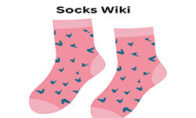Hi, I'm Christopher Bevans, the creator of SocksWiki.com. With a background in fashion design and a passion for innovation, I’m here to share my knowledge on socks from troubleshooting tips to detailed buying guides. I believe the right pair of socks can make all the difference, and through this site, I aim to help you find the perfect fit for every occasion.
Hi, I'm Christopher Bevans, the creator of SocksWiki.com. With a background in fashion design and a passion for innovation, I’m here to share my knowledge on socks from troubleshooting tips to detailed buying guides. I believe the right pair of socks can make all the difference, and through this site, I aim to help you find the perfect fit for every occasion.
Nowadays, a frequent question from the parents is “Why is my son’s sock hard and sticky?”. These unexpected textures not only compromise comfort but also raise concerns about hygiene and clothing care practices.
From lingering detergent residues to the impact of sweat and body oils, several factors can contribute to this undesirable phenomenon- the socks of your son are hard and sticky.
Understanding the root causes behind stiff and tacky socks is essential for implementing effective solutions, ensuring your son’s comfort, and maintaining the longevity of his clothing.
Involving in these potential reasons equips you with the knowledge needed to address and prevent this frustrating issue effectively.
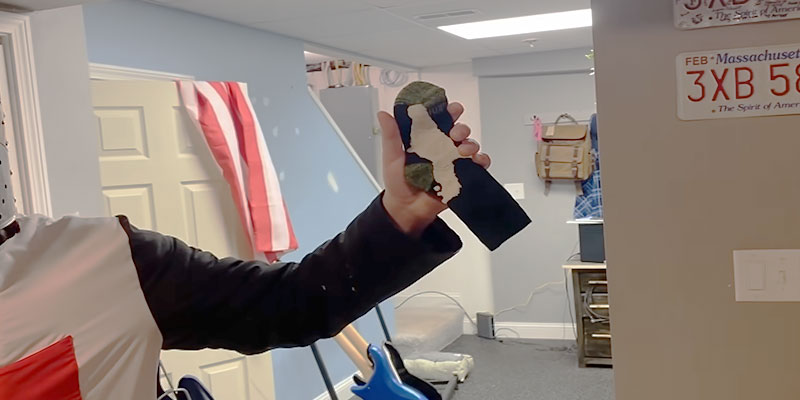
5 Reasons Why Your Son’s Socks Are Hard and Sticky?
Finding your son’s socks hard and sticky can be quite perplexing!
Here are five possible reasons why this might be happening:
1. Residual Detergent
Detergent is essential for cleaning clothes, but if not rinsed out properly, it can leave behind a residue that accumulates over time.
This residue not only affects the texture of the socks but can also lead to skin irritation for those sensitive to certain chemicals.
To prevent this, ensure that your washing machine completes its rinse cycle thoroughly, and consider using a detergent specifically formulated for sensitive skin or one that rinses out easily.
2. Excessive Fabric Softener
Fabric softeners contain compounds designed to coat fibers and make clothes feel softer. However, using too much fabric softener or not diluting it properly can result in a sticky residue on fabrics.
This residue can build up over time, especially in fabrics that have a tighter weave, like socks.
Consider using less fabric softener than the recommended amount, or opt for dryer sheets instead, which can provide a similar softening effect without the risk of residue buildup.
3. Sweat and Body Oils
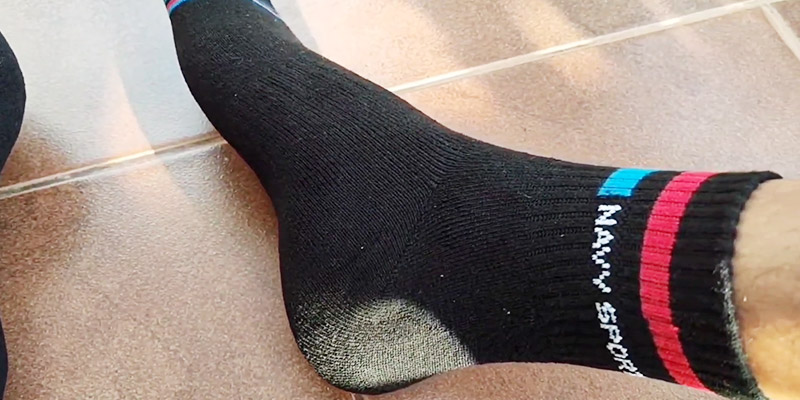
Our feet are prone to sweating, especially when confined within shoes for extended periods.
Sweat, combined with natural oils produced by the skin, can transfer onto socks and contribute to their stickiness.
Regularly washing socks after each wear can help prevent the buildup of sweat and oils.
Additionally, consider wearing moisture-wicking socks made from materials like bamboo or merino wool, which can help keep feet dry and minimize odor.
4. Improper Drying
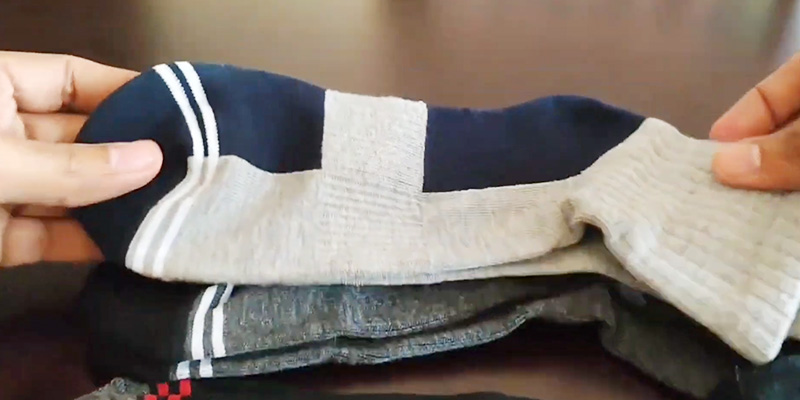
Drying clothes thoroughly after washing is crucial for preventing stiffness and musty odors.
If socks are not dried properly, whether due to insufficient time in the dryer or being left to air dry in a damp environment, they can develop a sticky texture as they dry.
To ensure your son’s socks dry effectively, use a proper drying cycle on your washing machine or hang them in a well-ventilated area with good air circulation.
5. Low-Quality Materials
The quality of the materials used to make socks can significantly impact their comfort and durability.
Socks made from low-quality synthetic fibers or blends may lack breathability, leading to moisture retention and a sticky feel.
Investing in socks made from natural fibers like cotton, bamboo, or wool can help prevent this issue.
These materials offer better breathability, moisture-wicking properties, and overall comfort for everyday wear.
Solutions to Hard and Sticky Socks
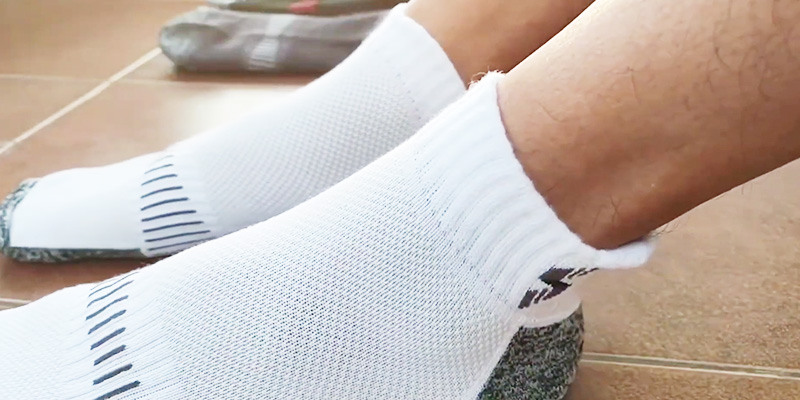
Dealing with hard and sticky socks can be frustrating, but there are several solutions to help restore their softness and comfort.
Here are some effective strategies to address the issue who ask “why are my sons socks hard?”:
Proper Washing Technique
Ensure that you’re washing your son’s socks with an appropriate amount of detergent and that they’re being rinsed thoroughly.
If you suspect detergent residue is causing the problem, consider using less detergent or switching to a detergent specifically formulated for sensitive skin.
Additionally, using a gentle or delicate wash cycle can help prevent excessive wear and tear on the socks.
Reducing Fabric Softener
If you use fabric softener, be mindful of the amount you’re using and how you’re applying it. Too much fabric softener can leave behind a sticky residue on socks.
Consider using half the recommended amount or opting for dryer sheets instead, which can provide a similar softening effect without the risk of residue buildup.
Regular Washing and Drying
Encourage your son to wash his socks after each wear to prevent the buildup of sweat, oils, and bacteria that can contribute to stickiness.
Proper drying is also essential; make sure socks are dried thoroughly either in a dryer on a low heat setting or air-dried in a well-ventilated area.
Avoid leaving damp socks in a pile, as this can lead to musty odors and stiffness.
Choosing High-Quality Materials
Invest in socks made from high-quality materials like cotton, bamboo, or merino wool.
These natural fibers offer better breathability, moisture-wicking properties, and overall comfort compared to synthetic materials.
Look for socks with reinforced seams and cushioned soles for added durability and comfort.
Proper Storage
Store clean socks in a dry, well-ventilated area to prevent them from absorbing moisture and developing a sticky texture.
Avoid storing socks in plastic bags or containers, as this can trap moisture and lead to unpleasant odors. Instead, use breathable fabric or mesh organizers to keep socks fresh and dry between wears.
FAQs
What Does It Mean When Your Son’s Socks Are Hard and Sticky?
Hard and sticky socks could indicate that your son has been sweating excessively, leading to the accumulation of sweat and bacteria on his socks, which have dried and hardened.
Why are my son’s socks always stiff and uncomfortable after washing?
This could be due to detergent residue left behind during the washing process.
If socks aren’t rinsed thoroughly, the leftover detergent can accumulate in the fibers, causing them to feel stiff and sticky.
What causes socks to feel sticky even after they’ve been washed?
One common culprit is using too much fabric softener or not diluting it properly.
Excessive fabric softener can leave behind a sticky residue on socks, especially if they’re made from synthetic materials.
How can I prevent my son’s socks from becoming hard and sticky?
Ensuring proper washing and rinsing techniques can help prevent detergent buildup. Additionally, using less fabric softener or opting for dryer sheets instead can reduce the risk of sticky residue.
Regularly washing socks after each wear and drying them thoroughly can also prevent stiffness.
Could the material of the socks be causing them to feel sticky?
Yes, the material of the socks can play a significant role. Socks made from low-quality synthetic fibers or blends may lack breathability, leading to moisture retention and a sticky feel.
What should I do if my son’s socks still feel sticky even after trying different washing methods?
If you’ve tried adjusting your washing routine and the socks still feel sticky, it might be worth examining other factors such as the quality of the water or the detergent being used.
Hard water, for example, can contribute to detergent buildup and affect how clothes feel after washing.

Hi, I'm Christopher Bevans, the creator of SocksWiki.com. With a background in fashion design and a passion for innovation, I’m here to share my knowledge on socks from troubleshooting tips to detailed buying guides. I believe the right pair of socks can make all the difference, and through this site, I aim to help you find the perfect fit for every occasion.
- Latest Posts by Christopher Bevans
-
How to Get Rid of a Sock Tan Line Naturally & Quickly
- -
What Socks to Wear With Grey Suit and Brown Shoes
- -
What Socks to Wear With Dress Shoes in 2026?
- All Posts
